Iran's authorities infuriated by Australian embassy's support for LGBTQ

Iranian authorities have been enraged by an Instagram post on the official page of the Australian embassy in Tehran that marked the annual LGBTQIA+ awareness day.

Iranian authorities have been enraged by an Instagram post on the official page of the Australian embassy in Tehran that marked the annual LGBTQIA+ awareness day.
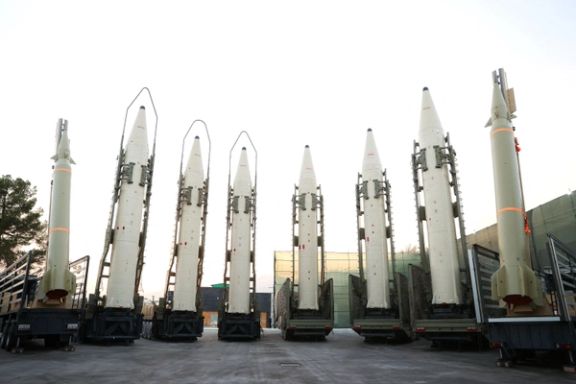
A report by the James Martin Center for Nonproliferation Studies has questioned the true scale of the threat posed by Iran’s ballistic missiles to Israel and potentially other regional countries.
Based on the April assault on Israel in which around 350 missiles, rockets and drones were fired towards the Jewish state, the fact most were intercepted by Israel and a US-coalition, shows only “some ability to strike Israel”, said Sam Lair, from the center.
Speaking to the Associated Press, he said: “If I were supreme leader, I would probably be a little disappointed.”
Lair said that if Iranian missiles are not able to hit targets precisely “that recasts their role”. He added: “They’re no longer as valuable for conducting conventional military operations. They may be more valuable simply as terror weapons.”
The report comes as Iran’s shadow war with Israel has once again peaked in the wake of the assassination of Hamas political leader Ismail Haniyeh in Tehran in July.
Though Israel has not claimed responsibility, it is believed to have been an Israeli missile strike from inside Iran’s borders.
Since the assassination, Iran has threatened to retaliate, but has waited several weeks in a bid to heighten the psychological war against its arch-enemy who is currently in the midst of a multi-front war with Iran’s proxies.
April’s assault was triggered by an alleged Israeli airstrike at the Iranian consulate in Damascus, killing a senior Quds Force commander and several other senior military personnel.
But its retaliation fell short of expectations, with claims from Iran of hitting the Nevatim Air Base falling flat. Instead of hitting the valuable fighter jets and military assets, the attack merely dented some holes in the runway, as seen by footage released by the Israeli military, showing that at least four missiles hit the base.
A team of experts from the James Martin Center for Nonproliferation Studies examined the alleged strike on the base, 65 kilometers south of Jerusalem in the Negev Desert, and said the only debris found in the area, collected from the Dead Sea, suggests Iran used Emad missiles to target Nevatim, the analysts told AP.
The liquid-fueled Emad, or “pillar” in Farsi, is a variant of Iran’s Shahab-3 missile built from a North Korean design with a reported range of 2,000 kilometers. That indicates the Emads were likely fired from the Shiraz area, which is within the estimated limits of the missile’s likely capabilities, the report said.
Based on Iran’s focus on the F-35I, the James Martin analysts assumed the likely target point for the Iranian fire would be a cluster of aircraft hangars. That offers “a much more valuable target” than just “poking holes in the runway,” Lair said. But none of the Iranian missiles directly hit those hangars.
Assuming Iran targeted the hangars, the James Martin analysts measured the distance between the hangars and the impact zones of the missiles. It gave an average of about 1.2 kilometers for the “circular error probable”, a measurement used by experts to determine a weapon’s accuracy based on the radius of a circle that encompasses 50 percent of where the missiles landed.
“This means the Emad is much less accurate than previous estimates indicated,” Lair said. “This indicates the Iranians are a generation behind where previous assessments thought they were in accuracy.”
Former British paratrooper and former Sandhurst senior lecturer, Andrew Fox, said Iran’s capability “is a paper tiger”.
“This is why they created their network of proxies and why the regime so desperately want nuclear weapons,” he said, speaking from Israel. “We know their capabilities from the Iraq-Iran war. They are no match for Israel’s military firepower and defensive strength.”
While Iran’s leaders continue to threaten a follow-up to April’s attack, he said it would be nothing more than “embarrassing”, and risk drawing the US into the battle.
“A far more likely method of revenge against Israel for the Haniyeh assassination is for Iran to use their proxies to stoke tensions in the West Bank and try to create a third intifada,” he said.
US intelligence agencies said in a report in July that Iran has “the largest inventory of ballistic missiles in the region and continues to emphasize improving the accuracy, lethality and reliability of these systems”.
The report from the director of national intelligence also said “Iran probably is incorporating lessons learned” from the April attack.
However, Behnam Ben Taleblu, an American Iranian and a senior fellow at the NGO, the Foundation of Defense of Democracies (FDD), told Iran International that while Iran's progress in its missile program should be looked at in the context of the maturity of the program, it cannot be downplayed.
“In the past few years people have been talking about Iran’s advances, in range and precision, but it has to be seen as relative in terms of the program and capabilities.
“Over the last decade, the missile attacks had not faced defended targets like the April attack against Israel. Never had Iran launched ballistic missiles from its own territory against Israel or against a defended target, and at that long range."
During the Iran-Iraq War, following the West's refusal to help build Iran's capabilities, Tehran significantly ramped up its missile program.
Many strikes have been launched by Iran but the targeted nations have often remained silent either due to a lack of military capability or an unwillingness to respond, as seen in Iraq and Syria. Notably, Pakistan stood out for its swift and decisive response to an Iranian missile attack.
He said the latest report, while important, reads like "more of the same" to those following Iran's progress closely. "It’s an indictment of the medium range systems that employ liquid propellant rather than the short range ones employing solid propellant," he said.
Iran’s medium range, nuclear capability missiles, remain weapons of terror, but with the capability to improve over time, he said, "though that hasn’t been brought to bear yet".
“If we see it as a nuclear delivery vehicle, we must still mention that four to seven missiles still reached Israel. Even if one of those had a nuclear warhead, it could be a game changer. So all of this has to be taken into account."
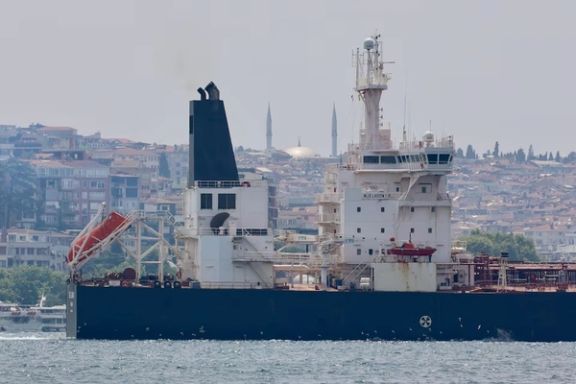
The Iran-backed Houthis in Yemen targeted a crude oil tanker in the Red Sea amidst its blockade targeting global shipping, with a Greek-operated vessel struck in the latest attack.
The US Central Command said in a statement that the Saudi-owned Amjad vessel and the Panama-flagged and Greek-operated Blue Lagoon I were hit in an attack but Saudi Arabia later denied the assessment.
However, Saudi’s national shipping company, Bahri, announced on Tuesday that "Amjad was not targeted and sustained no injuries or damage."
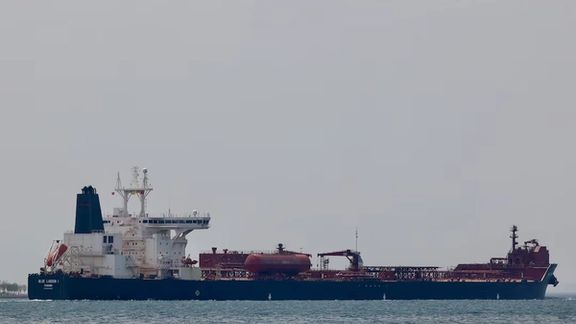
The vessel, which was carrying approximately two million barrels of crude oil, remains seemingly fully operational and is continuing its voyage to its planned destination without interruption.
Bahri emphasized that all relevant authorities were promptly informed, and that the company remains in continuous communication with its crew, closely monitoring the evolving situation.
Iran has vocally supported and praised the Houthis, but rejected claims that it has provided them with arms. The Houthis are a designated terror group by countries including the US and UK.
The US Central Command earlier revealed that the Houthis launched the assault using two ballistic missiles and an unmanned aerial vehicle, striking both vessels, calling the move "reckless acts of terrorism by the Houthis."
Although the Houthis claimed responsibility for targeting the Blue Lagoon with missiles and drones, they made no mention of the Amjad.
The Joint Maritime Information Center, responsible for tracking such incidents, reported that three ballistic missiles hit the Blue Lagoon I tanker 70 nautical miles northwest of the Yemeni port of Saleef.
The center "assesses that Blue Lagoon I was targeted due to other vessels within its company structure making recent port calls in Israel," it said in a report.
"All crew on board are safe. The vessel sustained minimal damage but does not require assistance."
Saudi Arabia, the world’s leading oil exporter, has expressed growing concern over the increased frequency of Houthi attacks on ships in the Red Sea, a maritime corridor for global energy supplies.
The attacks are part of a broader campaign by the Houthis, who have been emboldened by Iran’s support, and have dragged Yemen to become the region's poorest nation after a decade-long war civil war against a Saudi-led coalition.
The recent escalation follows a series of aerial drone and missile strikes by the Houthis, which they claim are in solidarity with Palestinians amid the ongoing conflict in Gaza, in a bid to force Israel into a ceasefire.
The Houthis began targeting maritime commercial traffic in mid-November, following a directive from Iran’s Supreme Leader Ali Khamenei, who urged Muslim nations to impose a blockade on Israel.
Initially concentrated in the Red Sea, these attacks have since spread to other vital waterways, including the Indian Ocean, disrupting international shipping and resulting in the capture of dozens of seafarers.
In response to this growing threat to global trade and freedom of navigation, a US-led coalition of over 20 nations has been formed to counter the blockade. It has seen joint attacks by the UK and US on Houthi infrastructure in Yemen.
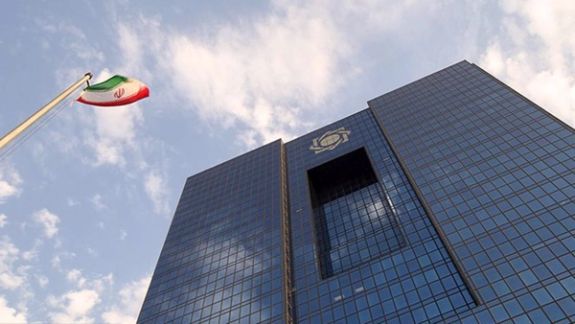
Iran's Central Bank Governor has been summoned by Parliament after reports surfaced of major loans being granted by the country's banks to their own employees and subsidiaries.
Earlier, in response to growing criticism over these loans, the Central Bank released a report on August 30, stating that the total loans provided by banks and credit institutions to their employees, managers, and board members in 2023 amounted to more than 9,100 trillion rials (over $1.5 billion).
Despite this amount of bank loans to their employees and subsidiaries, the Central Bank said that "reviews indicate that, given the issuance of the Central Bank's directives and regulations in this regard, these loans are under controlled management."
Two of the country's most influential banks, Mellat and Sepah Bank, issued the highest volume of loans, providing 190 trillion rials (over $315 million) and 145 trillion rials (over $240 million), respectively, to their subsidiaries last year.
Both banks are notorious for their controversial roles in Tehran’s political and financial arenas, having been accused of supporting military and nuclear programs—activities that have resulted in severe international sanctions. In the face of these sanctions and economic hardships, they have been propped up and kept afloat by Iran's Central Bank.
In reaction to news of the large loans to bank employees and subsidiaries, domestic media have highlighted the significant challenges ordinary citizens face securing loans for housing, marriage, entrepreneurship, and private sector ventures.
State media Khabar Online reported that the loans granted by banks to their employees and subsidiaries are nearly equivalent to the total amount needed for marriage loans for 300,000 people who have been waiting for months with no response from the Central Bank.
On Sunday, semi-official ILNA news agency reported that Jafar Ghaderi, a member of the parliament, mentioned the "distribution of astronomical loans" among bank employees and the "unequal access to loans among the public." He stated that the Governor of the Central Bank and several bank CEOs would be summoned to parliament to provide explanations on this matter.
The report highlights a stark disparity in loan ceilings between different groups. For some bank employees, the loan limit exceeds 10 billion rials (over $16,000), while retirees have a maximum loan limit of only 300 million rials ($500), which is less than what a bank teller earns in a month.
In contrast, tenants seeking rental deposit loans and couples looking for marriage loans face long waiting lists, with the banking system attributing these delays to a lack of financial resources.
Meanwhile, the latest July report from the Codal system indicates that the accumulated losses of Iran's banking system amount to 3,700 trillion rials (over $6 billion).
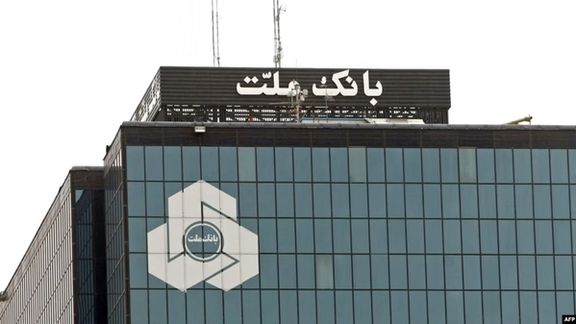
According to a report by Eco Iran on July 10, "the accumulated losses of the country's banking system have exceeded $6 billion, which is more than half of the projected oil revenues for this fiscal year (starting March 21). In other words, addressing the banks' accumulated losses would require at least 50 percent of this year's oil revenues."
The highest recorded accumulated loss belongs to Ayandeh Bank, which has exceeded 1,140 trillion rials nearly ($2 billion).
The latest figures from the Codal system suggest that Melli Bank had an accumulated loss of more than 760 trillion rials (over $1.2 billion) by the end of September last year, ranking second.
Other banks with significant accumulated losses include Sarmayeh, Sepah, Iran Zamin, Shahr, Dey, Keshavarzi, Maskan, Melal Credit Institution, Parsian, Tosee Taavon Bank, and Taavon.

The head of a major trade association for large-scale builders in Iran is blasting sanctions for blocking the country's entry into Iraq's housing market, urging the two governments to come up with a solution.
Blaming sanctions for restricting financial transactions and complicating the issuance of guarantees needed for contracts and tenders, Iraj Rahbar of the Mass Housing Builders Association told the semi-official ILNA news agency that these hurdles are why Iranian companies struggle to enter the Iraqi market.
"One of our problems is the issuance of guarantees, which we need for participating in tenders, and the maximum period for this is 10 days. However, we are not able to do this within this time frame, and even if a guarantee is issued, Iraq does not accept it," Rahbar said in the interview.
The head of the trade association admitted that the issue is not limited to Iraq, as other countries also do not accept Iranian guarantees.
Tehran faces sanctions primarily due to concerns over its advancing nuclear program, ballistic missile development, support for regional armed terrorist groups, and domestic human rights violations. These actions are seen by the U.S. and its allies as threats to regional stability and global security.
Iran is already a key player in Iraq's housing sector, as emphasized by Bahman Abdollahi, head of Iran’s Chamber of Cooperatives, and Osama Abdul-Redha Saad, a member of the Basra Council in Iraq.
In a recent meeting between the two, Abdollahi proposed constructing 150,000 housing units in Iraq, expressing readiness to supply materials, construction services, and consumer goods to support this initiative. Saad, in turn, implied that further collaboration between Iran and Iraq in the construction sector would be a logical step that could enhance both countries' interests.
Rahbar similarly said Iranian companies are fully equipped to handle housing projects in Iraq and have no technical hurdles, emphasizing that they have long been prepared and willing to enter the Iraqi market. Alluding to Iran’s unsuccessful attempts to break into Syria's construction market despite Tehran's readiness and efforts, Rahbar said that despite cooperation protocols being signed, “the Syrians did not commit to it and eventually were not willing to cooperate with Iran and Iranian companies, showing no interest."
"Given that we share a border with Iraq, commuting for project execution and the export of engineering services would be easier. However, we face challenges in exporting engineering services to Iraq," Rahbar said.
Rahbar noted that Iran previously relied on the Islamic Development Bank for financial guarantees and transfers with Iraq, leveraging its status as a major shareholder. However, he pointed out that this avenue of support is no longer available, likely due to the escalating effects of sanctions.
Over the past year, Iran's accelerated nuclear enrichment, ballistic missile development, support for proxy groups like Hezbollah, crackdown on domestic protests, supply of drones to Russia, cyberattacks, and its strikes on Israel have only deepened tensions with the West, making the removal of existing sanctions unlikely.
To overcome these challenges, Rahbar called on the governments of Iran and Iraq to establish specific agreements or frameworks to facilitate smoother economic cooperation and mitigate the effects of sanctions on their bilateral trade and business activities.
"The governments of Iran and Iraq must make solid agreements on this matter and provide mutual assurances for these agreements so that Iranian companies can enter the Iraqi market without risk or with reduced risk," he said.

As newly elected President Masoud Pezeshkian formed his cabinet, the country’s Supreme Leader—widely recognized as the ultimate authority in Iran—made a vain effort to appear detached from the selection process.
"Mr. President also consulted with me, and I endorsed some of the individuals I was familiar with or whose competence was conveyed to us through reliable sources. I emphasized that certain individuals should definitely be in the cabinet, while for many others, I simply stated that I had no opinion," Ali Khamenei said after the selection process concluded.
On the other hand, Pezeshkian, in an effort to defend his ministerial choices, emphasized his coordination with Khamenei. As a result, the parliament voted in favor of all the proposed ministers, despite the fact that just the day before, the largest faction in the parliament—representing more than two-thirds of the votes—had announced it would not support four of the nominees.
"The Islamic Guidance Minister initially did not want to join; Sir [Khamenei] ordered him, and he came along. I don't want to say these things; why are you forcing me to? I don’t want to go into details, but I want to say that I coordinated [with Khamenei] before coming here. Sir [Khamenei] himself said that Mrs. Sadeq should be in the cabinet. All these esteemed individuals have joined with coordination and understanding," Pezeshkian said.
Two key questions arise, which can help clarify the process and structure of ministerial selection in the Islamic government: What are the legal and actual roles of the Islamic Republic’s Leader in choosing ministers? How does this role influence the selection process, and what are its consequences?
Extralegal interference
Iran's Guardian Jurist, known as the "Vali-ye Faqih" or "Supreme Leader," is the highest authority in the Islamic Republic of Iran. To understand the role of the Guardian Jurist in selecting ministers, examining the Constitution alone is insufficient. According to the Constitution, the president nominates ministers, and the parliament approves or rejects them.
However, in practice, real political power lies with the Guardian Jurist, whose authority is absolute, unrestrained, and unaccountable. If he does not approve of a ministerial candidate and that candidate is still introduced, he can create three specific political challenges in the face of that decision.
First, the Guardian Jurist or his office would signal to parliament members not to vote for the candidate. If they defy this signal, the Guardian Council could disqualify them from the next election or initiate a criminal case against them.
Second, the Guardian Jurist could employ parallel security agencies, such as the IRGC intelligence, to undermine the candidate or damage their reputation.
Lastly, he could interfere with or disrupt the candidate’s ability to perform their duties effectively.
During Akbar Hashemi Rafsanjani's first term as president in the early 1990s, Khamenei's influence over the cabinet was relatively limited, as he was still in the early years of his role as Supreme Leader following the death of Ruhollah Khomeini, who had wielded considerable power. However, by Rafsanjani's second term, Khamenei had begun to consolidate his authority and exerted more influence over the selection of key ministers, including those for Foreign Affairs, Intelligence, Islamic Guidance, and Defense.
Under Mohammad Khatami's administration (1997-2005), Khamenei, along with the institutions under his control, took steps to ensure that key ministries—such as Foreign Affairs, Justice, Intelligence, Islamic Guidance, and Defense—remained under their influence. After a series of assassinations of dissidents and writers by Intelligence Ministry agents, Khatami succeeded in appointing his own choice for the Intelligence Ministry. However, when it came to the Ministry of Interior, Khamenei intervened by directing the Majles (parliament) to impeach Khatami’s preferred candidate and install his own choice instead.
In Mahmoud Ahmadinejad's first term as president (2005-2009), he and Khamenei maintained a harmonious relationship with little to no tension. During his second term, however, a significant rift emerged between them over the appointment of the Minister of Intelligence, Haydar Moslehi. In protest of Khamenei's decision, Ahmadinejad refused to attend work for 11 days, but ultimately, Khamenei's choice prevailed. This rift persisted for the remainder of Ahmadinejad’s presidency.
Hassan Rouhani secured his position by accepting Khamenei's vetoes and influence over the selection of ministers, which helped maintain a tension-free relationship. In contrast, Ebrahim Raisi was so closely aligned with Khamenei that his ministerial choices naturally reflected the Supreme Leader's preferences. This level of coordination was so strong that Khamenei even instructed Pezeshkian to ensure that his cabinet continued to follow the path set by Raisi.
Through this approach, Khamenei has gradually taken over the power to veto or impose cabinet members on the president without being accountable for their performance. Previous presidents often concealed this reality to avoid embarrassment and conflict with Khamenei.
Pezeshkian openly exposing Khamenei's interference in the ministerial selection process, has sparked resentment among some of Khamenei's loyalists in media outlets like Kayhan Daily.
The President typically expects three things from his ministers: loyalty to him, alignment with parliamentary expectations (to avoid impeachment), and enough public support to secure votes for him and his political coalition.
In contrast, Khamenei demands only loyalty and obedience. His involvement in selecting ministers thus ensures his absolute authority, channels resources into his economic interests, and guarantees the strict implementation of his policies.
Implications of the selection process
In Iran, the selection process for high-ranking officials often leads to the appointment of individuals with certain common traits. These individuals often lack a specific policy plan and are prepared to make promises to stay in power. They are typically adept at pleasing those in power and skilled in hiding corruption and inefficiencies within the government.
Despite claims of prioritizing merit and expertise in the selection of ministers, the level of government expertise in Iran has thus steadily declined, and the principle of meritocracy has been disregarded.
Competent individuals never attain high-level positions such as ministers or members of parliament. When experts are appointed to lower-level roles, they are often dismissed swiftly.
In one rare example, Kaveh Madani, a distinguished environmental expert and former deputy of the Environmental Protection Organization, was removed from his position quickly despite his expertise.
Political cliques and entrenched factions are determined to uphold the influence of those who further their interests and reinforce their own power. As a result, inefficiency, lack of transparency, and corruption have increased, leading to a growing erosion of public trust in the state.
The post was first published Monday, showing Ambassador Ian McConville and his colleagues celebrating the Wear It Purple Day in Iran, where homosexuality is officially banned, and homosexuals face the threat of execution.
Reacting to the post, Iran’s foreign ministry announced Tuesday that it had summoned McConville to “condemn” the publication of a post that “was offensive and against Iranian and Islamic norms and customs.”
The Instagram post, which expressed support for all sexual and gender groups, has been harshly criticized by Iran’s state-run media and religious officials. “Decisive action has to be taken against [McConville] in accordance with legal and Islamic ordinances,” said Alireza Arafi, a top Shia cleric and head of Iran's Islamic Seminaries.
In Iran, homosexuality is punishable by death for men and by 100 lashes for women. On repeated offenses, women can be also executed under the laws of the Islamic Republic which are based on a hardline interpretation of Shia Islam.
The US State Department has expressed concern about reports that Iran's “security forces harassed, arrested, and detained individuals they suspected or perceived as being LGBTQI+."
It’s unlikely that the Australian embassy was unaware of Iran’s official position on homosexuality. The decision to publicize the celebration may therefore be seen as a message of encouragement for the Iranian LGBTQI+ community suffering under Islamic rule.
“Today, and every day, we’re dedicated to creating a supportive environment, where everyone, especially LGBTQIA+ youth, can feel proud to be themselves,” the original post read. “Let’s keep championing diversity and inclusion for a brighter, more inclusive future 🤝🏳️🌈.”
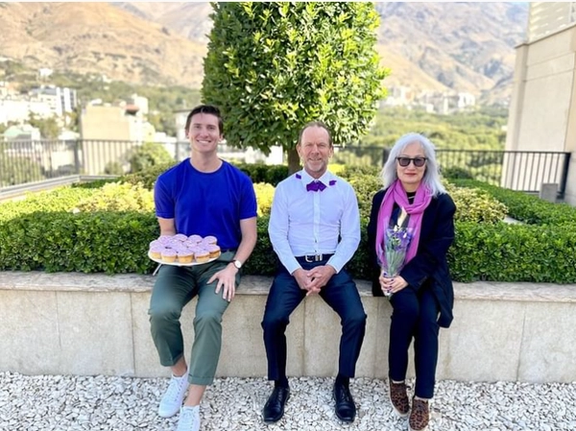
The sentiment was echoed by the German embassy in Tehran, which posted purple hearts in reply to the original post by the Australian embassy.
According to the brief published by Iran’s foreign ministry, the Australian ambassador was asked to take “appropriate measures to compensate” for the Instagram post. “Such actions by the embassy are inconsistent with international law and the Vienna Diplomatic Convention, which governs diplomatic conduct in respect to the host country's laws and regulations,” McConville was told.
Iran's laws allow individuals to change their gender identity markers on government-issued identification cards after gender-affirming surgery and by court permission. Many Islamic Republic apologists portray the country's "tolerance" of transgenders as an expression of liberalism.
However, the Islamic Republic seems to be exploiting the sex-reassignment surgery (SRS) as a means of purging gays and lesbians from public life, as evidenced in a 2019 report by Economist.